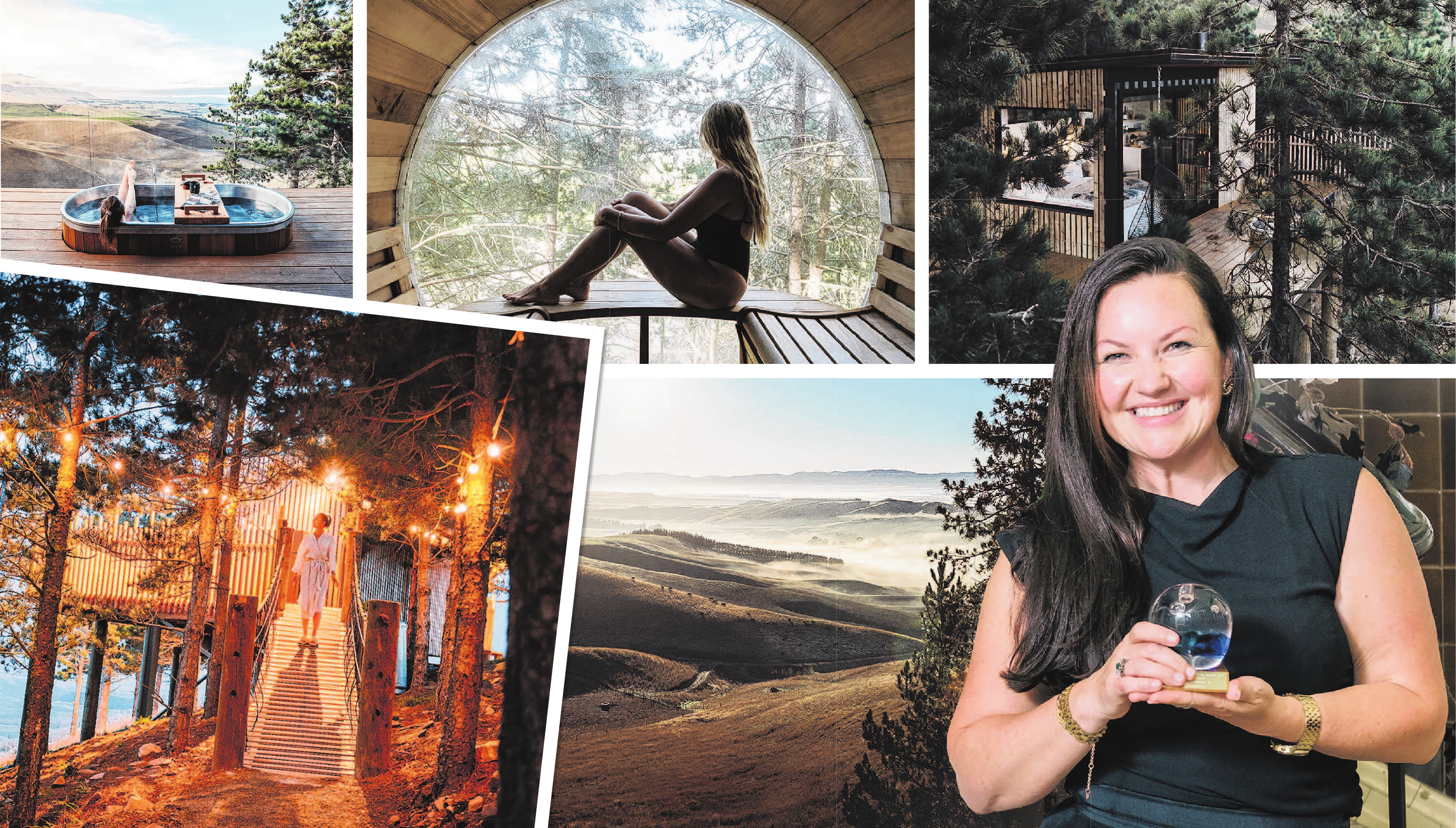
An accommodation business with a difference is going gangbusters in the Hakataramea Valley. Business editor Sally Rae talks to Nest Tree Houses co-founder Liz Hayes about her journey from television journalist to entrepreneurial rural woman.
"Random, eh," says Liz Hayes with a broad smile — and she’s not wrong.
She is talking about Nest Tree Houses, the award-winning business she and her husband Andy have developed on their dairy farm Million Springs at the mouth of the Hakataramea Valley, a property farmed by the Hayes family for six generations.
Everything about Nest is unlikely, from the destination — the expansive farming valley does not usually feature on lists of New Zealand’s holiday hotspots — to the style of accommodation. Tree houses? Really?
But the couple have hit on a winning formula as guests have flocked to the treetop havens, proving wrong their friends who thought they were "officially mad" when they learned of the plans.
Most recently, Mrs Hayes received the Experience Rural award at the NZI Rural Women New Zealand business awards in Wellington, a fitting acknowledgement for what is truly a rural experience, albeit a luxe one.
Growing up in urban Christchurch, Mrs Hayes had never heard of the Hakataramea Valley. While her orthodontist father owned farms as a hobby, and she had some exposure to rural life, she tended to be more on the "townie side".
The former TV3 news reporter studied journalism at broadcasting school and joined Newstalk ZB in Hamilton, driven north to her new job by her now husband whom she had met when she was 19.
He had studied for an agricultural commerce degree at Lincoln University and was spending six months on a dairy farm when her brother asked her to come out for herd testing. The attraction was instant.
The pair had a long-distance relationship for seven years; she moved to Dunedin to be closer to Mr Hayes and worked at Channel 9 before heading to Radio Live in Christchurch.
After the couple returned from several years travelling, she got a job at TV3 where her first live cross was from Aoraki/Mt Cook following the death of Sir Edmund Hillary in 2008.
Standing on a stool in her bare feet reporting the news to the nation was about as memorable as the Channel 9 interview with prime minister Helen Clark, itself a "real coup" which she had worked hard to get, only to discover at the end of the interview that the cameraman had failed to press record.
Loving the idea of long-form journalism, Mrs Hayes had always thought she would work in Auckland or overseas, but love scuppered that idea. The couple married in 2008 and she continued to work long-distance until pregnant with elder son Charlie, now 13.
The couple took over the farm in 2009 and immediately swung into converting the sheep and beef property into a dairy operation which now milks nearly 2000 cows.
While everyone in the rural community was "so beautiful and accommodating", it was a big internal change for the newshound as her career trajectory changed and she also became a mother. She missed the hum and busy nature of city culture.
But she could still also recall her first trip to Million Springs to visit Mr Hayes and driving over the lip into the valley and thinking how "absolutely stunning" it was.
Once the farm conversion was completed, along with a water scheme, Mrs Hayes was keen to diversify and she wanted something with "a bit of colour".
With other glamping-style accommodation in the wider area, she knew any accommodation venture had to have a point of difference and she also wanted something that was authentic.
There was a plateau on the farm with a small forest planted by Mr Hayes when he was a boy with his father Garfield, while Mrs Hayes was inspired by the "epic" treehouse she had as a child, complete with a flying fox and a bridge.
"Just that fun, that escapism. When you’re a kid, everything was free and it didn’t feel complicated. No decisions were being made, it was just fun and adventure."
Despite its proximity to Kurow, and also its central South Island location, the 830ha Million Springs and the Hakataramea Valley might be "in the middle of nowhere but it’s everywhere you want to be".
Consent was gained for two tree huts but the couple started with one, their theory being if no-one booked, then at least they had a good escape from the children — Charlie having been joined by Ayla, 11, and Hugo, 9.
But after opening Nest Tree Houses in 2021, complete with swing bridges and a sauna in the trees, the bookings did come and they were now virtually fully booked during the week until March for the two units.
Attention to detail had been key — it had to be reminiscent of a tree house rather than a house in the trees, she said.
One of the earliest guests came from Auckland especially to stay at Nest and that was, as Mrs Hayes recalled, "a bit of a pinch-me moment".
The acknowledgement at the RWNZ awards — which she described as "exceptionally run" — was special and she enjoyed meeting the other nominees. One of the other award winners, Amy Burke, was a former Kurow kid.
In her acceptance speech, Mrs Hayes spoke of the stereotypical image of a "farmer’s wife" which had been a big bugbear for her. Everyone had different talents and abilities and she spoke of the "incredible" work that generations of rural women had done, all around the country.
While they might be seen as farmer’s wives, they were "so much more", including her own mother-in-law Helen who was an accomplished painter, gardener and concert pianist, and she was inspired by the endeavours of other women in the area.
The change in recent times was that now the work was often being documented through the likes of social media.
"Everyone was doing it before, maybe not tree houses, [but] just as bold for the times but with just less noise," she said.
Nest was now usually bringing four people a day into the upper Waitaki area and the business was also now providing work for the "amazing" partners’ of staff on Million Springs.
Guests came from all walks of life and, while they had mostly been domestic, it was now getting almost a balance with international visitors. Anyone wanting a real dose of country life was able to enjoy a farm experience.
"To have so much positivity coming out of it has been a blessing," she said.












